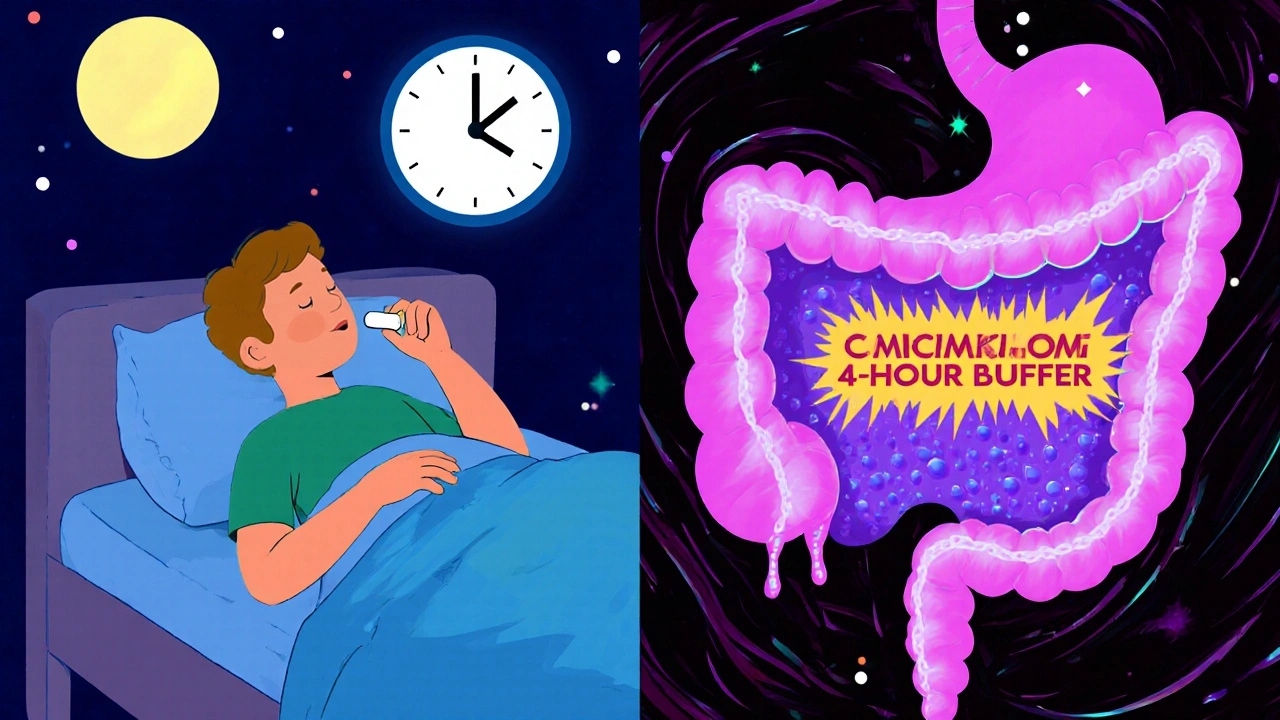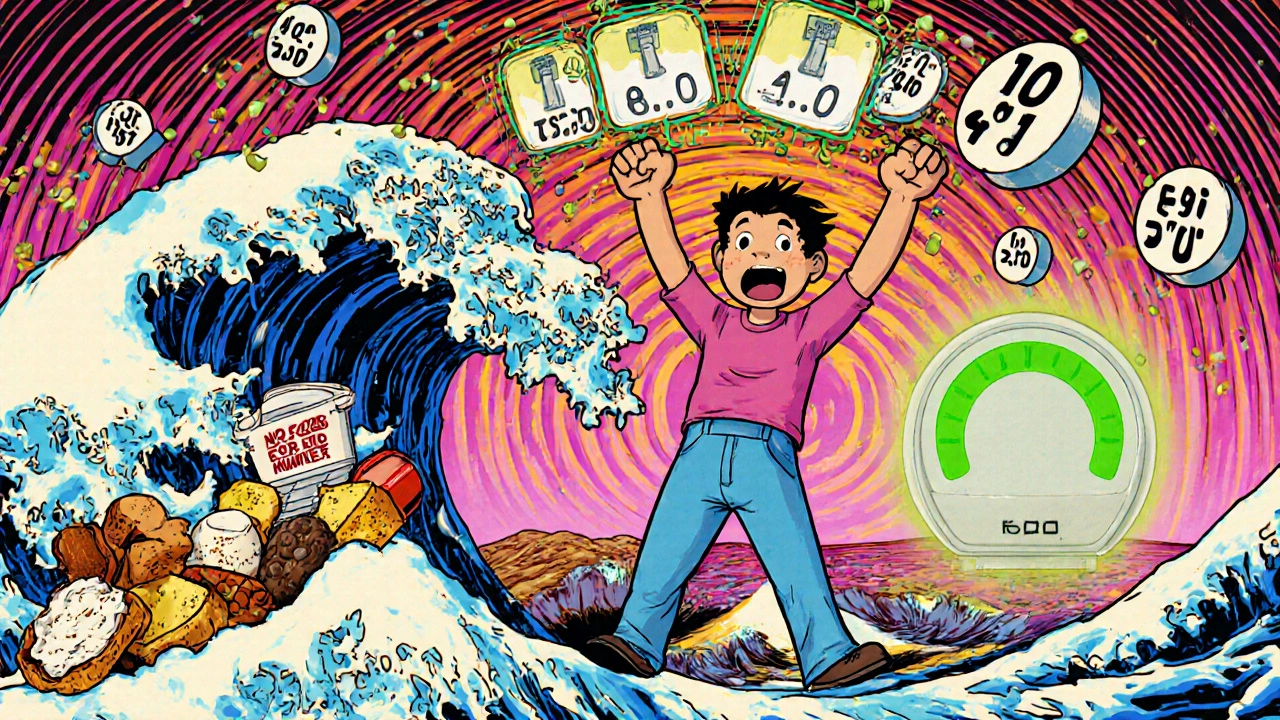Levothyroxine is one of the most commonly prescribed medications in the U.S., used by millions to treat hypothyroidism. But even if you take it every day, you might not be getting the full benefit - because timing matters more than you think. Taking it with coffee, right after breakfast, or alongside your calcium supplement can slash absorption by up to 60%. That’s not just a minor inconvenience - it can send your TSH levels spiraling, trigger fatigue, weight gain, brain fog, and even force your doctor to adjust your dose unnecessarily.
Why Timing Is Non-Negotiable
Levothyroxine isn’t like a multivitamin you can swallow with your morning oatmeal. It’s a hormone replacement that needs a very specific environment to be absorbed properly. Your stomach needs to be empty and acidic for the medication to dissolve and enter your bloodstream efficiently. Studies show that when taken with food, absorption drops by 20% to 50%. That means if you normally take 100 mcg, you might only be getting 50-80 mcg - enough to keep you symptomatic even if your lab numbers look okay.
The gold standard, backed by the American Thyroid Association, the FDA, and every major endocrine society, is to take levothyroxine on an empty stomach - 30 to 60 minutes before breakfast. This gives your body the best shot at absorbing the full dose. But why? Because food, especially high-fiber meals, soy, and calcium-rich items, binds to the medication in your gut and blocks it from being absorbed. Even a small snack or a cup of coffee can interfere.
What You Must Avoid With Levothyroxine
It’s not just food. Many common substances interfere with absorption. Here’s what you need to avoid within 4 hours of taking your pill:
- Calcium supplements - Reduce absorption by 27-36%
- Iron supplements - Can cut absorption by nearly 60%
- Soy products - Tofu, soy milk, edamame - reduce absorption by 20-30%
- Coffee - Even black coffee lowers absorption by 9-14%
- High-fiber meals - Oatmeal, bran cereal, whole grains - reduce absorption by 15-25%
- Proton pump inhibitors (PPIs) - Like omeprazole or esomeprazole - reduce absorption by 15-22%
If you take any of these, space them out. Take your levothyroxine first, then wait at least four hours before taking calcium or iron. If you drink coffee in the morning, wait until after your 60-minute window. Some patients report better results switching to decaf or waiting until after lunch for their coffee.
Bedtime Dosing: A Viable Alternative?
For many people, the 30-60 minute fast before breakfast is impossible. Maybe you’re rushing out the door. Maybe you get nauseous on an empty stomach - a common complaint known as “levo belly.” That’s where bedtime dosing comes in.
Research shows that taking levothyroxine at bedtime, at least 3-4 hours after your last meal, can work just as well - and sometimes better - than morning dosing. A 2022 study of 150 patients found no difference in TSH control between morning and evening dosing when both were done properly. Another study showed 27% higher absorption at night, likely because stomach acid levels are more stable overnight.
But it’s not for everyone. If you take other nighttime meds, or if you’re sensitive to medications affecting sleep, morning dosing may still be better. And if you eat late, bedtime dosing won’t work - you need that 3-4 hour gap after eating.
Many patients who switch report improved adherence. One survey found 79% of people stuck with bedtime dosing compared to only 63% with morning dosing. If your schedule makes morning dosing unreliable, talk to your doctor about trying bedtime. Just make sure you’re consistent - no switching back and forth.

Why Breakfast Is the Worst Time
Don’t take it with your breakfast. Not even a banana. Not even a bite of toast. Even “light” meals reduce absorption by 15-20%. A 2019 Brazilian study showed patients who took levothyroxine with breakfast had TSH levels jump from 1.7 to 2.9 - still technically in range, but enough to cause symptoms and trigger unnecessary dose increases.
Doctors often see patients who’ve been on the same dose for years but keep feeling tired. When they check timing, it turns out they’ve been taking it with coffee and yogurt for months. Fix the timing, and their TSH drops back to normal - no dose change needed.
How to Make It Stick
Consistency beats perfection. You don’t need to be flawless - you just need to be regular. Here’s how real patients make it work:
- Keep your pill next to your toothbrush. That way, you take it right after brushing - before coffee, before breakfast, before anything else.
- Use a pill organizer labeled “NO FOOD FOR 60 MINUTES.” Visual cues help.
- Set two alarms: one for taking the pill, one for breakfast. That 60-minute buffer is easy to forget.
- Try a medication tracker app like MyThyroidMedication. One study showed a 34% improvement in adherence with apps.
- If you travel, bring your pill with you and plan ahead. Jet lag doesn’t excuse poor timing.
Patients who follow these simple habits see fewer lab fluctuations and fewer doctor visits. One endocrinologist in Cleveland reported a 40% drop in unnecessary dose adjustments after teaching patients the timing rules.

Special Cases: Thyroid Cancer and Formulation Differences
If you’re a thyroid cancer survivor, your TSH target is much tighter - often between 0.1 and 0.5 mIU/L. Even small absorption changes can affect your cancer risk. For you, timing isn’t just important - it’s critical. Stick to the 30-60 minute fast before breakfast without exception.
There’s also a newer formulation called Tirosint - a soft gel capsule filled with liquid levothyroxine. It’s less affected by food and coffee, with only 8-12% absorption loss compared to 20-30% for tablets. But it costs 3-5 times more. For most people, sticking to timing rules with generic levothyroxine is cheaper and just as effective. But if you’ve tried everything and still have unstable labs, ask your doctor about Tirosint.
What to Do If Your TSH Is Still High
If you’ve been taking your levothyroxine correctly - on an empty stomach, no coffee, no calcium - and your TSH is still above 4.0, then the issue might be something else:
- Are you taking the right dose? Sometimes, weight changes or aging require a dose adjustment.
- Are you taking other meds that interfere? Check with your pharmacist.
- Do you have celiac disease or another gut condition? Malabsorption can mimic poor timing.
- Are you switching brands? Even generic levothyroxine can vary slightly between manufacturers. Stick with one brand unless your doctor says otherwise.
Don’t just increase your dose blindly. Test your timing first. Many patients think they need more medication - when they just need better timing.
Final Takeaway: It’s Simple, But It’s Hard
Levothyroxine works best when taken on an empty stomach, 30-60 minutes before breakfast. If that’s not possible, bedtime dosing 3-4 hours after your last meal is a proven alternative. Avoid coffee, calcium, iron, soy, and fiber for at least 4 hours around your dose. Be consistent. Track your habits. Talk to your doctor if your TSH doesn’t stabilize.
There’s no magic pill here. Just discipline. And that discipline - taking it at the same time, the same way, every day - is what keeps your thyroid levels steady, your energy up, and your body running the way it should.

Nathan Hsu
November 14, 2025 AT 03:55Levothyroxine timing is one of those things that sounds ridiculous until your TSH jumps from 2.1 to 7.8-and you realize you’ve been taking it with your chai latte since 2020. I’m from India, and here, people take it with paratha and tea like it’s a vitamin. No wonder so many of us feel like zombies. I switched to bedtime dosing after my endo yelled at me-now I take it at 11 PM, no food after 8 PM, and I’ve got my energy back. Also-coffee? Nope. Even decaf. I miss it, but I miss breathing more.
Ashley Durance
November 15, 2025 AT 20:42Let’s be real-most people don’t even know what TSH stands for. You’re telling me millions are on this med, but half of them are taking it with soy milk and oatmeal? Of course their labs look ‘fine’-they’re just getting 40% of the dose. And now you’re telling me bedtime dosing works? That’s not a breakthrough, that’s basic pharmacokinetics. Why is this even a discussion? If you can’t follow a 60-minute window, maybe you shouldn’t be managing your own hormones.
Scott Saleska
November 17, 2025 AT 12:11I’ve been on levothyroxine for 12 years. I used to take it with breakfast like everyone else. Then I started reading studies-turns out, even a sip of water with it can affect absorption if it’s not plain water. I switched to taking it at 5:30 AM with a full glass of water, no coffee until 7 AM, and calcium supplements at dinner. My TSH went from 4.2 to 1.9 in 8 weeks. Also, I tried Tirosint once-it was expensive, but honestly? Worth it if you’re a perfectionist. I still use generic though. Just discipline. No magic.
Ryan Anderson
November 19, 2025 AT 06:20THIS. THIS. THIS. 🙌 I was on 125 mcg for 3 years, felt like a sloth, and my doctor kept saying ‘your labs are fine.’ Turns out I was taking it with my protein shake. One change-empty stomach, 60 min wait-and now I’m running 5Ks. I started using MyThyroidMedication app. It sends me a reminder, tracks my coffee intake, and even tells me if I took it too close to calcium. I don’t know what I did before this app. Thank you for posting this. You just saved someone’s life. 💪
Eleanora Keene
November 20, 2025 AT 11:20I want to say thank you for writing this so clearly. I’ve been struggling with fatigue and brain fog for years, and no one ever told me it could be about timing. I just thought I was lazy. I started taking my pill right after brushing my teeth-before I even turn on the coffee maker-and within two weeks, I felt like myself again. I’m not a doctor, but if you’re reading this and you’re tired all the time? Try this. It’s not a miracle. But it’s a start. You deserve to feel better.
Joe Goodrow
November 21, 2025 AT 11:05Why are we letting foreigners and scientists tell us how to take our medicine? In America, we take our pills when we feel like it. I take mine with my breakfast burrito and a Red Bull. If my TSH is high, I just take another pill. Simple. Why make it complicated? This whole ‘empty stomach’ thing sounds like a hippie diet trend. I’ve been on this med for 15 years-I’m still alive, right?
Don Ablett
November 23, 2025 AT 07:54It is worth noting that the pharmacokinetic profile of levothyroxine is highly dependent upon gastric pH and intestinal motility. Studies conducted by the Canadian Thyroid Association in 2021 suggest that the variability in absorption between morning and evening dosing is statistically insignificant when fasting conditions are maintained. However, the practical implementation of these guidelines remains suboptimal in population-based cohorts due to socioeconomic and behavioral factors. Further research into patient adherence patterns is warranted.
Kevin Wagner
November 24, 2025 AT 16:07Let me tell you something-this isn’t just about thyroid meds. This is about taking control of your damn life. You want energy? You want to stop feeling like a zombie? Stop treating your body like a vending machine. You don’t get to swallow a pill and then immediately wreck it with coffee, soy, and carbs. You want results? You gotta show up. I switched to bedtime dosing after my wife left me because I was ‘always tired.’ Now I sleep better, I’m happier, and my TSH is rock solid. It’s not hard. It’s just not easy. And that’s the point.
gent wood
November 26, 2025 AT 09:26Excellent summary. I’ve been managing hypothyroidism for 18 years, and this is the most accurate, practical guide I’ve seen. I take mine at 6:00 AM, water only, no coffee until 7:30. I’ve kept a journal since 2015, and my TSH has never fluctuated more than 0.3 since I started. Consistency is everything. I also avoid soy entirely-it’s not just the tofu, it’s the hidden stuff in processed foods. Read labels. It’s tedious, but it works.
Dilip Patel
November 26, 2025 AT 16:04Bro this is all fake news. In India we take levothyroxine with ghee and turmeric milk and we are fine. Your doctors are just trying to sell you more pills. Also why you need to wait 60 min? I take it with breakfast and I run 10km. You Americans overthink everything. My cousin in Delhi takes it with chai and he is still working at 70. This is western medicine nonsense.
Jane Johnson
November 27, 2025 AT 04:47Bedtime dosing is not a viable alternative. It contradicts the FDA’s labeling. The original studies were conducted under controlled morning conditions. Any deviation is anecdotal and potentially dangerous. If you are not following the approved protocol, you are not adhering to medical guidelines. This post is misleading.
Sean Hwang
November 28, 2025 AT 23:34Man I was taking mine with my protein bar and wondering why I was always tired. Switched to morning empty stomach and boom-more energy. No magic. Just don’t eat right after. I still forget sometimes, but now I keep the pill on my nightstand and take it right when I wake up. Simple. Works. No need to overcomplicate it.
Barry Sanders
November 30, 2025 AT 00:32Wow. Just… wow. You took the time to write all this? And you’re telling people to wait an hour after waking up just to take a pill? That’s not discipline-that’s obsession. I take mine with my coffee and my cereal and I’m fine. If you’re still tired, maybe you’re not actually hypothyroid. Maybe you just need to sleep more or stop eating kale. This post is peak wellness culture.